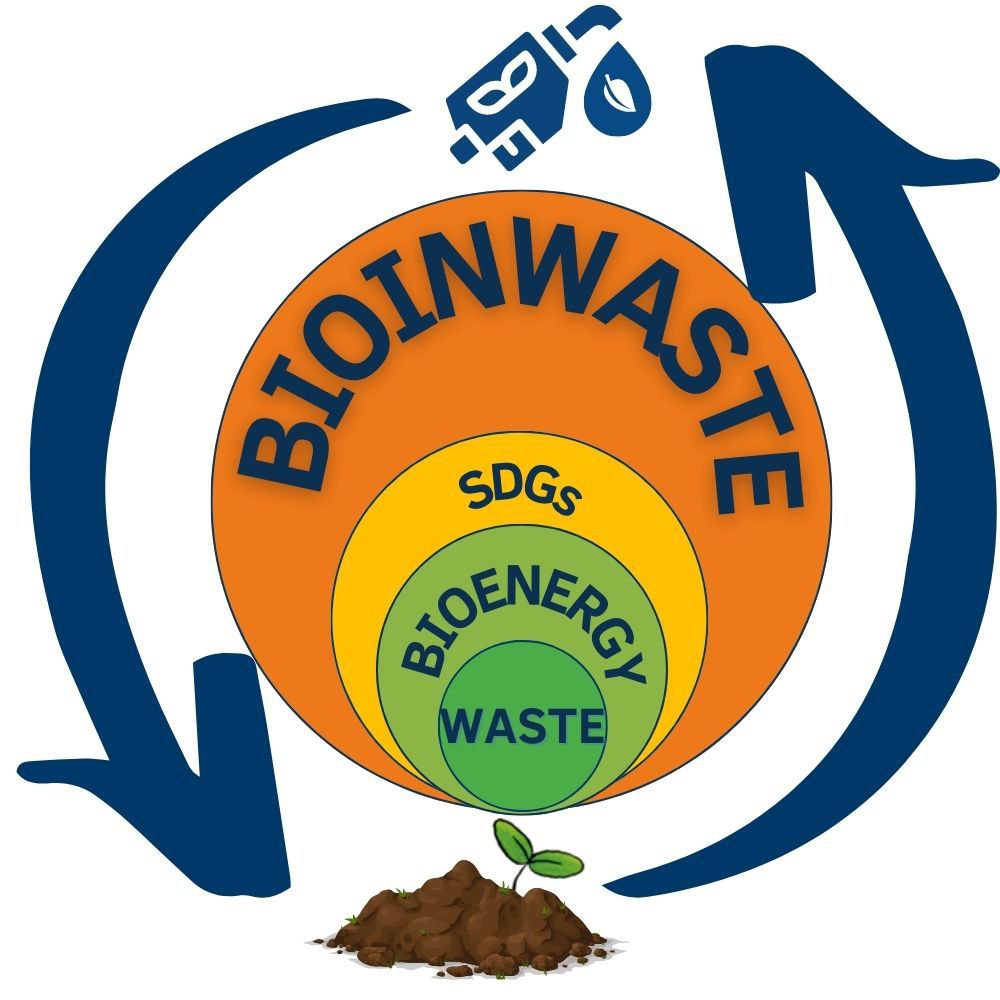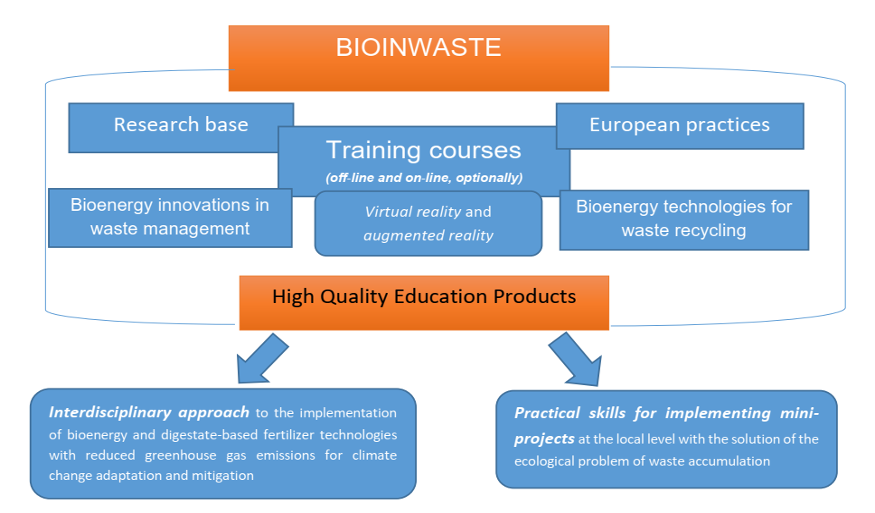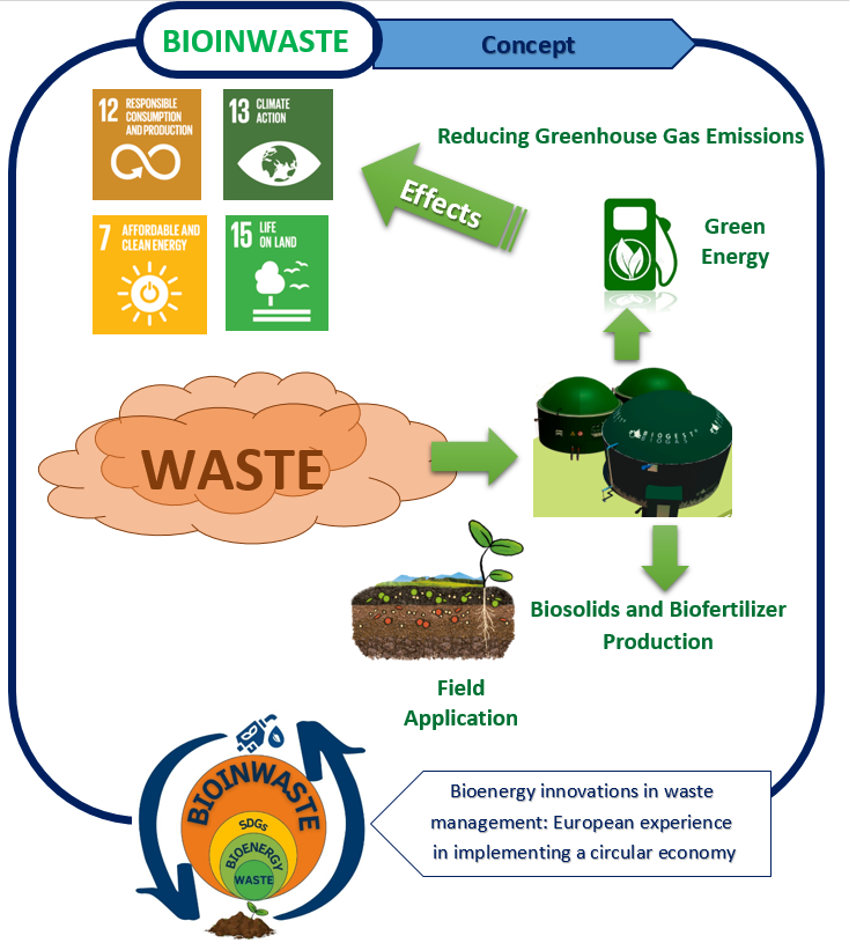
“Funded by the European Union. Views and opinions expressed are however those of the author(s) only and do not necessarily reflect those of the European Union or European Education and Culture Executive Agency. Neither the European Union nor the granting authority can be held responsible for them”.

Project name: Bioenergy innovations in waste management: European experience in implementing a circular economy
Project acronym: BIOINWASTE
Project No 101085172
Type Action: ERASMUS-JMO-2022-MODULE
Duration: 2022-2025

Team:
- Yelizaveta Chernysh, Project coordinator, Associate Professor;
- Iryna Ablieieva, Team member, Associate Professor;
- Victoriia Chubur, Team member, PhD student;
- Yevhen Bataltsev, Team member, PhD.
Background and general objectives
The worldwide research is advancing focused on the use of renewable and by-products as raw materials as carbon substrates as well as nutrient additive sources for different bioconversion processes. This material can be used in anaerobic digested and aerobic conversion with bio-products production.
Modern society produces annually large enough volumes of waste that can be used to produce clean energy resources, which offers many potential benefits for sustainable development. The production and use of biogas embodies the idea of a more circular economy, bringing the benefits of reduced greenhouse gas emissions, improved waste management, and increased resource efficiency. Biogas also allows the integration of rural areas and industry in strengthening the energy security and energy independence of the state.
The main objective of the project is to build interdisciplinary skills among students, teachers, the public and other target groups by drawing on the positive experiences of EU countries to ensure the implementation of bioenergy technologies for waste recycling.
The project also is aimed at enhancing the efforts of local communities in solving environmental problems with waste recycling by introducing biogas technologies, as exemplified by the Czech Republic, Sweden, Germany and Austria. For this purpose, a series of webinars will be held with the solution of thematic tasks for specific communities in Ukraine.
In the project promoting the European Green Deals will be facilitated by training course “EU implementation of bioenergy technologies for waste recycling” per each year (60 hour course for all specialities students), which includes the following topics:
- Introduction to EU experience of bioenergy innovations in waste management.
- Bioeconomy as a basic for green growth.
- Characterization of biofuel feedstock (derived from food waste, sewage sludge etc.).
- Unexplored and potential feedstock for sustainable bio-product production in EU.
- Potential role of bioenergy in contributing to the carbon capture and sequestration issues.
- Research ecosystem in EU: bioenergy technologies growth.
- Case-study of EU implementation of bioenergy technologies for waste recycling.
- The EU environmental safety in the context of the waste bio-recycling.
Distance series of webinars with open access for general public on topic integration of biogas technology research using access to the Biogas Research Team, Faculty of Tropical AgriSciences, Czech University of Life Sciences Prague (Czech Republic), Linköping University (Sweden) and Biogas Solutions Research Center (Sweden) (30 hours per academic year). Virtual visiting the laboratories and getting information about the research ecosystem of European organizations.
Project outputs:
- will be an analysis of the European experience in supporting the local implementation of biotechnology for energy generation with waste recycling, implementation and opportunities to use its elements in Ukraine;
- knowledge of various representatives of the target audience about the concept of European Green Deals will be increased, which will contribute to the dissemination of knowledge among different segments of the population for the implementation of recycling wastes biotechnologies in the future;
- students and teachers will become active participants in the study and discussion of international practices in this field, which will contribute to obtaining skills in developing bioenergy projects and their feasibility studies based on best practices of EU countries.
Project outcomes:
- Students and teachers will have a unique opportunity to gain new knowledge through an interdisciplinary approach to the implementation of bioenergy and digestate-based fertilizer technologies with reduced greenhouse gas emissions for climate change adaptation and mitigation;
- Participants will be able to use the knowledge and experience gained in their professional activities and gain practical skills for implementing mini-projects at the local level with the solution of the ecological problem of waste accumulation.
Concept of project

